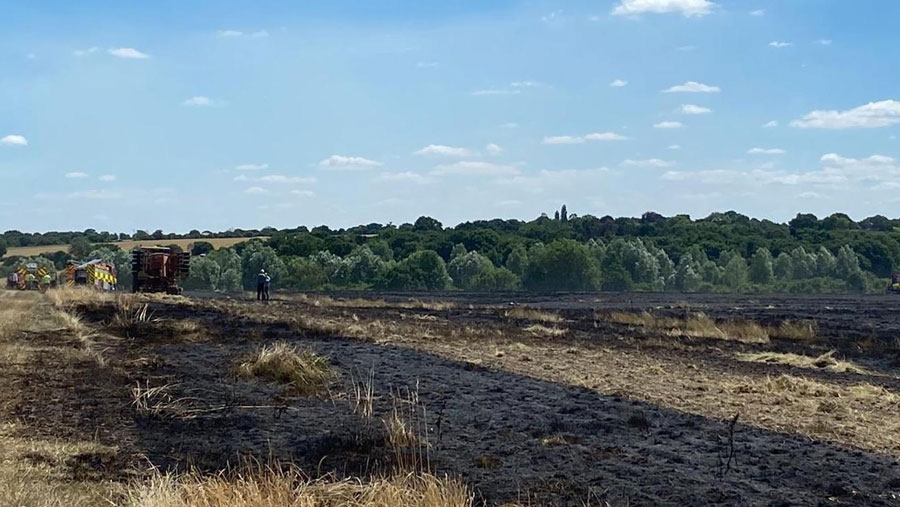Fire crews tackle field blazes amid July heatwave
 © Essex Fire and Rescue Service
© Essex Fire and Rescue Service Fire crews were called into action to tackle several serious field blazes over the weekend, and their quick thinking prevented the flames from destroying large areas of standing crops.
Two crews from Chelmsford, Essex, were called to tackle a field fire at Ceres Rural consultant Ed Hutley’s home farm in Hartford End, Felsted.
The farmer had been combining grass seed when a flint sparked on the stripper head and ignited the dry grass shortly before 1.30pm on Saturday 9 July.
See also: How to protect your farm from fire risk and stay legal
The flames quickly spread and destroyed 3.2ha (eight acres) of grass, but also came within just a few metres of a much larger field of winter wheat.
On arrival, firefighters requested help from crews from Wethersfield and Witham fire stations to help supply water in the area.
A combination of farmers using machinery to cultivate around the field and crews using water helped to extinguish the fire by 2:14pm and prevent it from spreading.
Hereford farm arsons
In Herefordshire, police and fire crews tackled a field fire at Newton Farm behind Vernon Williams Close in Hereford on Saturday.
Police and Fire have attended a fire on the field behind Vernon’s Williams Close. There has been a number of similar incidents which our Safer Neighbourhood Team are monitoring and all have been very dangerous. If you have any information regarding this, please contact 101. pic.twitter.com/JDauhvbYTW
— Hereford SNTs (@HerefordCops) July 9, 2022
Local officers from Herefordshire Police said there had been a number of similar incidents which its safer neighbourhood team were monitoring and “all have been very dangerous”.
On 24 June, fire crews extinguished flames at two areas of cut grass that had been deliberately set alight.
Anyone with information is asked to call the police non-emergency number on 101.
In Cambridgeshire, firefighters were called to tackle a field fire at 3.45pm on Sunday 10 July at Low Farm in Waresley, near the Bedfordshire border.
Crews from Cambourne, Gamlingay, Kimbolton, St Ives and Huntingdon, along with a crew from Sandy in Bedfordshire, attended the incident. They arrived to find a fire involving around 12ha (30 acres) of cut straw and a standing barley crop and extinguished it using hose reels.
The crews returned to their stations by 6.30pm. There were conflicting reports over the cause of the fire, but Cambridgeshire Fire and Rescue Service said it was accidental.
Suffolk field fire
In west Suffolk, fire crews were called to tackle a large field blaze in Kennett. Shortly before 2pm on Friday 8 July, a fire broke out in a field in Heringswell Road, which led to the temporary closure of nearby roads.
Six fire crews from stations across Suffolk and Cambridgeshire were sent to tackle the blaze.
*ROAD CLOSURE*
Please be advised Heringswell Road is closed due to a significant field fire. @SuffolkFire currently have multiple appliances on scene and dealing.
Motorists are advised to avoid the area
#1088 pic.twitter.com/T2p9w7KmLK— Mildenhall Police (@MildnhallPolice) July 8, 2022
According to rural insurer NFU Mutual, its most recent figures show the cost of farm fires was £69m for 2020. Electrical faults were a major cause of fires, but extreme weather and dry conditions also contributed to the year on year rise of 40%.
Ceres Rural urges farmers to stay fire safe this harvest
As harvest begins and temperatures increase, the danger of field and machinery fires is being highlighted by Ceres Rural. Temperatures last weekend topped 30C and are forecast to be even hotter next weekend.
Forecasters believe the UK may record its hottest day yet, surpassing the highest temperature yet recorded of 38.7C (102F) at Cambridge University’s Botanic Garden on July 25, 2019.
Ceres Rural stresses that a well communicated emergency procedure and action plan is fundamental when instructing farm employees of the steps to follow, both to minimise the impact of the field or machinery fire, but also to safeguard their own health, safety and welfare.
Key messages from this early season alert include recording the locations of all fire extinguishers and using signs within buildings to indicate their whearabouts. Fire extinguishers that are carried on-board machinery such as combine harvesters are frequently overlooked for annual inspection and servicing, so these should be noted.
However, Ceres Rural health and safety expert Rob Gazely cautions that these are not appropriate for fighting large fires and are rather a tool to ensure that employees can safely withdraw from a fire situation. It is also vital to be aware of the locations of nearby sources of water including ponds, lakes, reservoirs and rivers.
These might not be located on your own land but could be essential to the fire brigade for controlling a fire if they can be directed to the water sources promptly on arrival.
“Farm staff are urged to have a ready-filled water bowser on standby, but to act with caution when tackling a fire that cannot be quickly extinguished, and should first and foremost concentrate efforts on personal safety,” said Mr Gazely.
“Where efforts are made to control this fire, individuals need to be mindful of smoke inhalation, especially if not wearing respirators, and should withdraw for their own safety if necessary.”
Downloading and using the What3words app is critical in directing emergency services to the incident.

